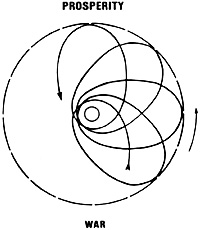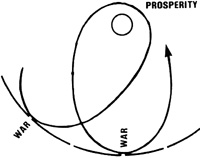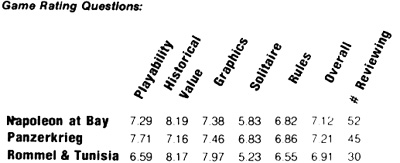Whereas the message of NLB was to transcend the struggle against history, NAL demonstrates (by quantification) the power, albeit misdirected, of the human Spirit transcendent
Side One: Transcending the Wheel
We in the nuclear age find it difficult to disassociate ourselves from the international arena and the fate of nations War. which we all dread, seems the more imminent as the Wheel of History grinds once again, perhaps the last time, through the downswing of its deadly course. Yet we continue to believe in a future, and not just of scattered survivors but of civilization.
In the forty or so years since the inception of the Manhattan Project, we have only too well incorporated the spectre of extinction into our lives We have found a way to submerqe the idea into our inconscious, so that we know it, and yet can go about our lives, just as we ignore and disbelieve our own individual death. But if we are to believe a future and are to do anything to save it, we must find a way of coming to terms with the real situation we face.
In doing this, a study of history is essential. It will help provide a perspective on present events, such as the decline of American economic power. Such a perspective may reveal the forces of history, ignorance, greed, and fear, and the momentum they have against any great man's idealism. He may unleash others of history's forces, such as Napoleon did with his armies of abstractly-motivated citizens, to gain in his conflict within the Wheel of History, but he may never oppose the motion of the wheel itself.
Thus, the study of history is not to learn the secrets of history's victorious armies or successful economic systems. It is to learn that the forces of history, outside our control ruled the destiny of all who entered onto its arena.
Imagine you were driving in the desert, and every so often you stopped for gas, for food and rest, and directions, admiring a series of sunsets, and patterns of vegetation along your way. Suppose however, you notice a certain roadside building which looks familiar. You drive on, and find a sign which reveals you are in the same place that you were in two days ago. Suddenly the horrifying realization comes upon you that you have traversed a great circle not once, but many times.
This is the message of history
 Actually, history presents itself as a series of loops, of varying sizes, within the larger circle, so that, depending upon which loop you watch, you may see progress, optimistic news, or
decline and pessimism. It might look something like this at right:
Actually, history presents itself as a series of loops, of varying sizes, within the larger circle, so that, depending upon which loop you watch, you may see progress, optimistic news, or
decline and pessimism. It might look something like this at right:
Using this example, we complete the cycle, to pick a number at random, twice a century: 1620 1700, 1740, 1800. 1910, 1940 (Thirty Years, Spanish Succession, Seven Years,' Napoleonic, Franco-Prussian and World Wars, respectively).
However, it would be an illusion to assume that historical time has anything to do with calendar.
 This example of a complete circle must in turn be re-imagined as merely a complete loop in a larger circle as at right:
This example of a complete circle must in turn be re-imagined as merely a complete loop in a larger circle as at right:
0f course this theory of History as wheel is just a useful way of arranying and looking at events As a theory it does not purport to represent anything like an objective existence for history. Just a useful grouping of patterns. Whether an historian sees two events as following one from the other on a single loop or as separate and unrelated is of small consequences to us.
The model does not admit of causal relationships between events in a loop any more than if that loop were straightened to a segmented line, a lower point would cause a higher one. The cause-effect chain is strictlv absent. Time flows onward and as we go around, we can spot certain signpoints. And to identify these signpoints to check our progress, we need to study history's fabric and to search its patterns.
The irony of mankind's destruction at his own hands is the immediate short term problem that we face. We have to circumvent the wheel's progress. However, this may not be possible. Our only hope may be to escape from the inevitable and monotonous repetition of history by removing ourselves altogether from the wheel This is the long term prohlem we. or our theoretical descendants, will face anyway This would mean the evolution of all mankind to a higher level of existence. transcendence, of which recognising the fact ot the wheel within which we struggle is the first step.
History is the road map which can take us, safely at last, out of the unending desert.
Side Two: The Spirit is not something you had in school with incredulous commentary by D. Isby.
To know something requires ceasing scrutinizing its shadow' measuring its diameter, naming its color and assessing its consistency Instead it means understanding abstractly its essential nature Not 'what do I look like,' not 'what do I do.' not 'what do I respond to but who am I, what is the essence of myself, or anything?'
The essential nature of any piece of music is one of many repeated motives, occuring singly or simultaneously, with the addition of an implied or sounded harmonization While Linda Ronstadt wails out the melody, the band plays the chords corresponding to each motive in the melody. In Bach there are four melodies at once, in Strauss there are often eight.
But music is only one example. The master painters do not entertain themselves with perfecting the outline and color of their subjects. but use these devices to indicate their true inner nature. Later, shape is abandoned to express only the substance beneath.
[This is 1950's expressionistic dogma and is just as much dogma as anything the realists ever came up with. If you always abandon your shape, you cannot communicate your perception ]
To go beyond the mere surface appearance of things one must stop depending on the sensory side of the brain and fire-up the analytical and imaginative side. -- once you saw the clouds and the sky floating behind Monet's waterlilies, you could never go back to seeing just a pastiche of colors -- you will henceforth hear the separate voices in Bach, not just the kaleidoscope of sound -- you will discover the true nature of the spirit, not the unwilling actor. The mind must synthesize these expenences. not just passively receive them.
But this process is 'analytical' in the largest sense of 'coming to know something apart from sensory input;' using an expanded awareness which is not limited to the material appearances of things, but which awareness essential natures can direct/y, abstractly or telepathically impress. Napoleon used that super-material input, the direct knowledge ol essential natures, in his campaigns. Not intuition, which is chancy, but simply the opening of the spirit to impressions beyond those which came through the bodily senses. "After listening carefully for a few minutes, Napoleon issued his orders." He used his hearing to confirm what his spirit had already grasped.
Try good staff work (Berthier) and thorough reconnaissance.
Analysis implies a detailed examination through which to discover the segments of a whole and how the parts are related together: Harmony. But we are all aware of harmony without having to do any methodic analysis (here the terminology will trip me up), without, lets say, concentration, paper-and- pencil work. Our bodies, actually our spinal column. the root of the brain, is always aware of harmonic tension or dissonance, and reflexively relaxes after a built-up consonance -- abstractions for which we all have built-in receptors: just as we have trained the eyes to perceive abstractions such as 'yellow' and 'cylindrical,' 'alphabet' and 'numeral.'
Just as dissonance is perceptible without strenuous thought, so are the natures of human beings. We communicate to each other on more frequencies than the five senses -- thats only the AM band. Not specific thoughts (which fail anyhow to more than give badges to our condition), but our underlying attitudes, feelings, intentions and motivations at that moment, which find partial expression in our actions and words. Once having identified and isolated essential traits amongst his adversaries. Napoleon knew how to interpret the input of his 'extrasensors.'
[The senses are the only way ideas can be expressed!]
To be an artist is to speak of substance, of the human spirit, of essential natures. Not that numbers turn the tide of battle, but that a single spirit can infuse all with his will to prevail. Precisely because it is not conventionally perceived. this spiritual force is irresistable.
[Dangerous nonsense. All the spirit in the world means nothing against a Spandau MMG or a B-52 strike, nor can it contravene the laws of gravity or stay the sun's ascent. That is irresistable, not any vague, spirit.]
Our expenence tells us that the physical world is solid real, and independent of us Ouantum mechanics says, simply that this is not so According to Stapp there definitely is not a substantive physical world therefore it is evident that even physicists who disclaim metaphysics have difficulty avoiding it (Zukav. p 101-105).
Morale. Napoleon said, counts three times as heavily as numbers. His own presence on the battlefield he considered, was worth 100,000 men (presumably on a good day). Nothing is done without first being imagined (even if it comes out unexpectedly) Thus. imagination is a kind of prescience and omniscience, which, once recognised raises one right off the material plane of existence,takes one on a trip through the clouds.
Bibliography:
Hofstadler: Goedel Escher Bach
An Eternal Golden Braid: Basic Books
Zukav: The Dancing Wu Li Masters: An Overview of the New Physics
Morrow Quill Paperbacks
NOTICES
Experiments That Failed
In WDM we announced a new availability date policy which, we hoped, would be something we could manage Well, it seems that once you set a date, the game demands to come out later apparently regardless of how much extra time you allow On the other hand, if you don't set a deadline, a game never gets done al all We will continue to announce our scheduled publication dates. but will probably continue to run late
In the same issue we announced a discount policy Strangely, very few orders took us up on these discounts, even those that were eligible. In light of this, at the urging of wargaming's wholesale dealers' we are withdrawing the discount offer.
Survey Results:
[Note that the survey will be back next issue ]
Most suprising is that, of the 100 gamers responding. the average number of games owned is around 100! Truly a select group (I wonder how many of these games have been played) You are overwhelmingly wargame- oriented, and fantasy games are particularly baleful to you You are strongly interested in Napoleonic and World War II era games. (Could it be because we have only published games in these eras?)

New Prices
Last issue we announced imminent price increases New production analysis indicates that, while some prices are wildly low, others seem tenable at their present levels. Therefore, we are going to gamble on keeping our prices low, temporarily, in order to increase our distribution. Note, however, that prices will certainly go up on 1 February 1980. At that time, Rommel & Tunisia will sell for $22, while Panzerkrieg and Dark December will be raised to $15.
Dark December Map Supplement
This project has been thrown back to the designer for further development So far. demand has been slight Thus the Map Supplement will be published as a four-page insert in the next issue of Wargame Design.
Back to Wargame Design Vol. 1 Nr. 3 Table of Contents
Back to Wargame Design List of Issues
Back to Master Magazine List
© Copyright 1979 by Operational Studies Group.
This article appears in MagWeb (Magazine Web) on the Internet World Wide Web.
Other military history articles and gaming articles are available at http://www.magweb.com